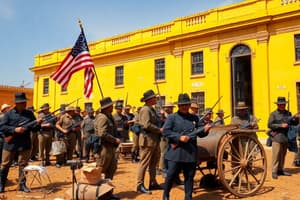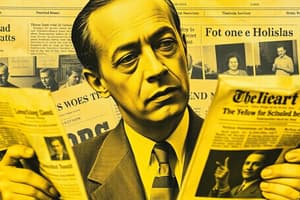Podcast
Questions and Answers
What is Yellow Press also known as?
What is Yellow Press also known as?
- Yellow Journalism (correct)
- Sensational Journalism
- Tabloid Journalism
- Penny Press
Who was the most famous yellow journalist?
Who was the most famous yellow journalist?
William Randolph Hearst
What was Joseph Pulitzer known for?
What was Joseph Pulitzer known for?
Competing with Hearst using yellow journalism
What major change did Hearst's reporting style bring to American journalism?
What major change did Hearst's reporting style bring to American journalism?
Who authored 'Our Country' related to Anglo-Saxon superiority?
Who authored 'Our Country' related to Anglo-Saxon superiority?
Who was Alfred Thayer Mahan?
Who was Alfred Thayer Mahan?
What does the Monroe Doctrine declare?
What does the Monroe Doctrine declare?
Who was Queen Liliuokalani?
Who was Queen Liliuokalani?
What were Cuban insurrectos known for?
What were Cuban insurrectos known for?
What was Gen. Butcher Weyler's strategy during the Cuban rebellion?
What was Gen. Butcher Weyler's strategy during the Cuban rebellion?
What was the significance of the de Lome Letter?
What was the significance of the de Lome Letter?
What does the phrase 'Remember the Maine' refer to?
What does the phrase 'Remember the Maine' refer to?
What did McKinley's war message urge?
What did McKinley's war message urge?
What did the Teller Amendment promise?
What did the Teller Amendment promise?
Who was Commodore George Dewey?
Who was Commodore George Dewey?
Who was Emilio Aguinaldo?
Who was Emilio Aguinaldo?
What motivated the Hawaiian annexation?
What motivated the Hawaiian annexation?
Who was Gen. William Shafter?
Who was Gen. William Shafter?
What were The Rough Riders famous for?
What were The Rough Riders famous for?
Who was Col. Leonard Wood?
Who was Col. Leonard Wood?
What happened during the Battle of Santiago?
What happened during the Battle of Santiago?
What did the USS Oregon's journey demonstrate?
What did the USS Oregon's journey demonstrate?
What did the Anti-Imperialist League object to?
What did the Anti-Imperialist League object to?
What did the Insular Cases determine?
What did the Insular Cases determine?
Flashcards are hidden until you start studying
Study Notes
Yellow Press
- A term for sensationalist journalism during the Spanish-American War, often utilizing exaggerated reporting.
- Most notably associated with William Randolph Hearst, this form of journalism was criticized for its omissions and half-truths.
Joseph Pulitzer
- Competed with Hearst in the realm of yellow journalism to increase newspaper sales.
- Became a prominent figure in the Democratic Party.
William Randolph Hearst
- A leading figure in American newspaper publishing from 1863 to 1951.
- Credited with transforming journalism through sensational headlines and dramatic reporting.
Rev. Josiah Strong
- Authored "Our Country," promoting Anglo-Saxon superiority.
- Linked Anglo-Saxonism to Christian missionary work, gaining popularity in the late 1800s.
Alfred Thayer Mahan
- A U.S. Navy officer whose strategic theories on naval power influenced American naval policy.
Monroe Doctrine
- Established in 1823, this policy warned European powers against interfering in the Western Hemisphere, viewing such interference as a threat to U.S. sovereignty.
Queen Liliuokalani
- The last monarch of Hawaii, overthrown by American business interests through a revolution.
Cuban Insurrectos
- Cuban rebels who resorted to burning crops and infrastructure to provoke either Spanish withdrawal or U.S. intervention during the Cuban War for Independence.
General "Butcher" Weyler
- A Spanish general known for his brutal tactics in attempting to suppress the Cuban rebellion, including the establishment of concentration camps for civilians.
de Lome Letter
- A letter from the Spanish Ambassador that criticized President McKinley, leaked to American newspapers and stirred public sentiment for war in 1898.
Remember the Maine
- A rallying cry during the Spanish-American War, referring to the sinking of the USS Maine in Cuba, which was sensationalized by the press, leading to calls for military action.
McKinley's War Message
- Advocated for U.S. military intervention to liberate Cubans from Spanish rule.
Teller Amendment
- Legislation assuring that the U.S. would not annex Cuba following the Spanish-American War.
Commodore George Dewey
- Led U.S. naval forces in the Philippines during the Spanish-American War, achieving a significant victory at the Battle of Manila Bay on May 1, 1898.
Emilio Aguinaldo
- Filipino general who collaborated with the U.S. forces during the Spanish-American War and later fought for Philippine independence from U.S. control.
Hawaiian Annexation
- The U.S. annexed Hawaii due to economic interests in sugar production, facing resistance from local natives.
General William Shafter
- Commanded the U.S. invasion of Cuba, leading decisive victories at battles including Las Guasimos, El Caney, and San Juan Hill.
The Rough Riders
- A cavalry unit led by Teddy Roosevelt, renowned for their charge during the battle at San Juan Hill.
Colonel Leonard Wood
- Commander of the Rough Riders; he later established an effective military governance in Cuba following the war.
Santiago
- The location of a significant naval battle where the entire Spanish fleet was destroyed during the Spanish-American War.
USS Oregon
- A battleship that traveled from the West Coast to Cuba, highlighting the need for a Panama Canal for efficient military movement.
Anti-Imperialist League
- A group opposing the annexation of the Philippines and expansion of U.S. power abroad, motivated by various beliefs about idealism, self-interest, and constitutionalism.
Insular Cases
- A series of Supreme Court decisions that ruled inhabitants of U.S. territories possess some rights of U.S. citizens but not all.
Dr. Walter Reed
- Notable for his work in discovering the cause of yellow fever, significantly contributing to public health and military medicine.
Studying That Suits You
Use AI to generate personalized quizzes and flashcards to suit your learning preferences.




